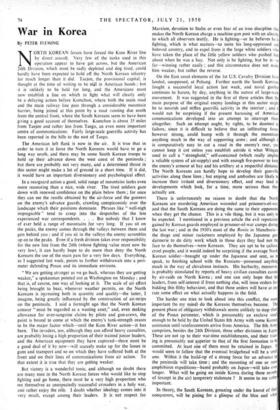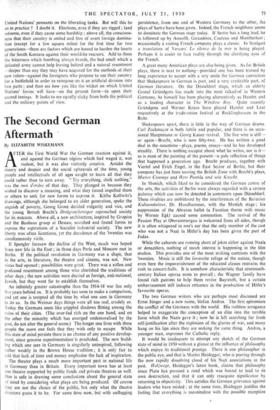War in Korea
By PETER FLEMING
NORTH KOREAN forces have forced the Kum River line by direct assault. Very few of the tanks used in this operation appear to have got across, but the American 24th Division, which must be sadly depleted and dog tired, could hardly have been expected to hold off the North Korean infantry for much longer than it did. Taejon, the provisional capital, is thought at the time of writing to be stiff in American hands ; but it is unlikely to be held for long, and the Americans must now establish a line on which to fight what will clearly only be a delaying action before Kumchon, where both the main road and the main railway line pass through a' considerable mountain barrier, being joined at this point by a road running due south from the central front, where the South Koreans seem to have been giving a good account of themselves. Kumchon is about 35 miles from Taejon and rather less from Taegu, an even more important centre of communications. Fairly large-scale guerrilla activity has been reported in the hills to the east of Taegu.
The American left flank is now in the air. It is-true that in order to turn it in force the North Koreans would have to go a long way south, and there may be some South Korean troops to hold up their advance down the west coast of the peninsula but there are probably not very many, and a determined thrust in this sector might make a lot of ground in a short time. If it did, it would have an important diversionary and psychological effect.
In a rearguard action a good, solid range of mountains looks even more reassuring than a nice, wide river. The tired soldiers gaze down with renewed confidence on the plain below them ; for once they can see the results obtained by the air-force and the gunners on the enemy's advance guards, crawling conspicuously over the landscape which their positions dominate. Phrases like " well-nigh impregnable " tend to creep into the despatches of the less experienced war correspondents. . . . But nobody that I know of ever held a range of mountains for very long. If you sit on the peaks, the enemy comes through the valleys between them and gets behind you ; and if you sit in the valleys the enemy scrambles up on to the peaks. Even if a fresh division takes over responsibility for the new line from the 24th (whose fighting value must now be very low), it can hardly hope to do more than deny the North Koreans the use of the main pass for a very few days. Everything, as I suggested last week, points to further withdrawals into a peri- meter defending Pusan and its immediate environs.
" We are getting stronger as we go back, whereas they are getting weaker," a spokesman pointed out in Washington on Monday ; and that is, of course, one way of looking at it. The scale of air effort being brought to bear, whenever weather permits, on the North Koreans is increasing both in quantity and quality—the latter, I imagine, being greatly influenced by the construction of air-strips on the peninsula. I said a fortnight ago that the North Korean armour " must be regarded as a wasting asset," and, even making allowance for over-sanguine claims by pilots and gun-crews, the point is bound to come at which the enemy's tank-strength ceases to be the major factor which—until the Kum River action—it has been. The invaders, too, although they can afford heavy casualties, are probably losing a high proportion of their trained junior leaders, and the American equipment they have captured—there must be a good deal of it by now—will scarcely make up for the lossei in guns and transport and so on which they have suffered both at the front and on their lines of communications from air action. To that extent it is true that they are getting weaker.
But victory is a wonderful tonic, and although no doubt there are many men in the North Korean forces who would like to stop fighting and go home, there must be a very high proportion who see themselves as unexpectedly successful crusaders in a holy war, and rather enjoy the role. I doubt whether ideology comes into it very much, except among their leaders. It is not respett for
Marxism, devotion to Stalin or even fear of an iron discipline that makes the North Korean charge a machine-gun post with an alacrity to which all observers testify. He is fighting—or he believes he is fighting, which is what matters—to unite his long-oppressed and beloved country, and to expel from it the large white soldiers who have taken the place of the little yellow soldiers who pushed him about when he was a boy. Not only is he fighting, but he is—so far—winning rather easily ; and this circumstance does not make him weaker, but rather the reverse.
On the East coast elements of the 1st U.S. Cavalry Division have landed, unopposed, at Pohang-. Further north the South Koreans fought a successful local action last week, and naval gunfire continues to harass, by day, anything in the nature of large-scale movement. It was suggested in the first of these articles that the main purpose of the original enemy landings in this sector might be to nourish and stiffen guerrilla activity in the interior ; and it would not be surprising if the present harassing of American communications developed into an attempt to interrupt them altogether. Such an attempt ought, by rights, to be doomed to failure, since it is difficult to believe that an infiltrating force, however strong, could hump with it through the mountains anything much in the way of supporting arms ; and although it is comparatively easy to cut a road in the enemy's rear, you cannot keep it cut unless you establish astride it what Wingate used to call a " stronghold," self-contained (which really implies a reliable system of air-supply) and with enough fire-power to keep the enemy's armour at bay and his artillery at a respectful distance. The North Koreans can hardly 'hope to develop their guerrilla activities along these lines ; but sniping and ambushes are likely to increase their irritant and diversionary effect, and may lead to developments which look, for a time, more serious than they actually are.
There is unfortunately no reason to doubt that the North Koreans are murdering American wounded and prisoners-of-war, and that the South Koreans are doing the same to their opponents when they get the chance. This is a vile thing, but it was only to be expected. I mentioned in a previous article the evil reputation gained by Korean guards employed in prisoner-of-war camps during the last war ; and in the 1930's most of the Ronin in Manchuria- the thugs and minor racketeers employed by the Japanese gen- darmerie to do dirty work which in those days they had not the face to do themselves—were Koreans. They are apt to be callous, cruel people, and it would indeed be surprising. if the average North Korean soldier—brought up under the Japanese and sent, so to speak, to finishing school with the Russians—possessed anything much in the way of chivalrous instincts. His barbarity, moreover, is probably stimulated by reports of heavy civilian casualties caused by air-raids on North Korea ; and one can only hope that his leaders, from self-interest if from nothing else, will issue orders for- bidding this filthy behaviour, and that these orders will have at any rate some effect on what actually happens in the field.
The harder one tries to look ahead into this conflict, the more important (to my mind) do the Koreans themselves become. The present phase of obligatory withdrawals seems unlikely to stop sho of the Pusan perimeter, which is presumably an enclave small enough to be held by the United States 8th Army with some Korean assistance until reinforcements arrive from America. The 8th Army comprises, besides the 24th Division, three -other divisions in Japan. These are not up to their war-time establishments, and their train- ing is presumably not stiiperior to that of the first formation to be committed. At least one of them must be retained in Japan. It would seem to follow that the eventual bridgehead will be a small
one. Within it the build-up of a strong force for an advance up the peninsula will take time ; and the mounting of one or more amphibious expeditions—based probably on Japan—will take even longer. What will be going on inside Korea during these months of (except in the air) temporary stalemate ? It seems to me rather important.
In theory, the South Koreans, groaning under the knout of their conquerors, will be pining for a glimpse of the blue and while United Nations' pennants on the liberating tanks. But will this be so in practice? I doubt it. Elections, even if they are rigged ; land reforms, even if they cause some hardship ; above all, the conscious- ness that their country is united and free of overt foreign domina- tion (except for a few square miles) for the first time for two generations—these are factors which are bound to harden the hearts of the South Koreans against their would-be rescuers. Add to them the bitterness which bombing always breeds, the bad smell which a defeated army cannot help leaving behind and a natural resentment —deeper than any they may have acquired for the methods of their new rulers—against the foreigners who propose to use their country for a battlefield in order to reimpose on it an artificial division into two parts ; and then see how you like the wicket on which United Nations' forces will have—on the present form—to open their second innings. It looks to me equally sticky from both the political and the military points of view.



































 Previous page
Previous page